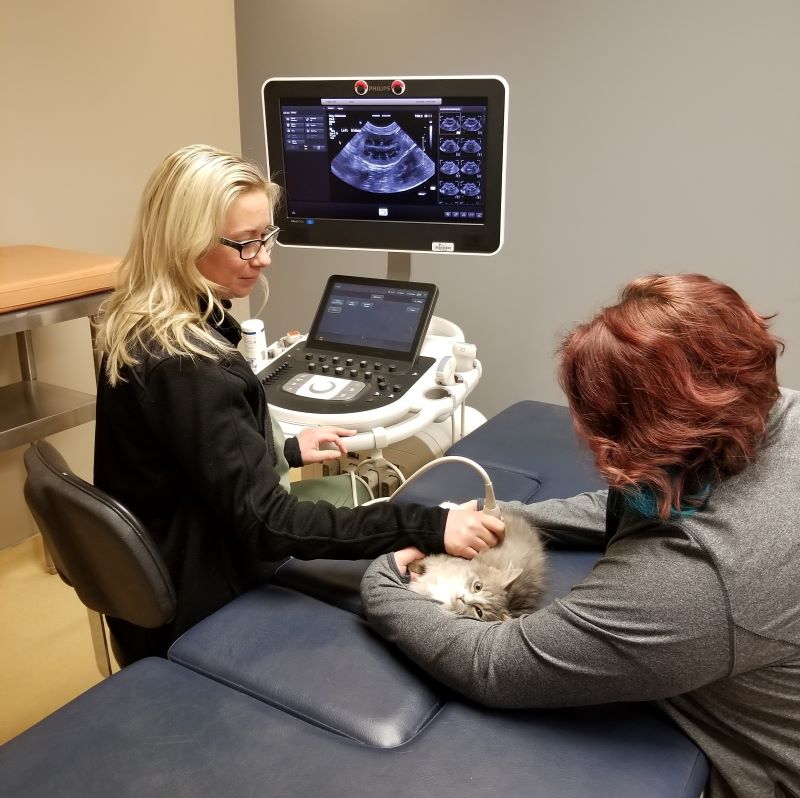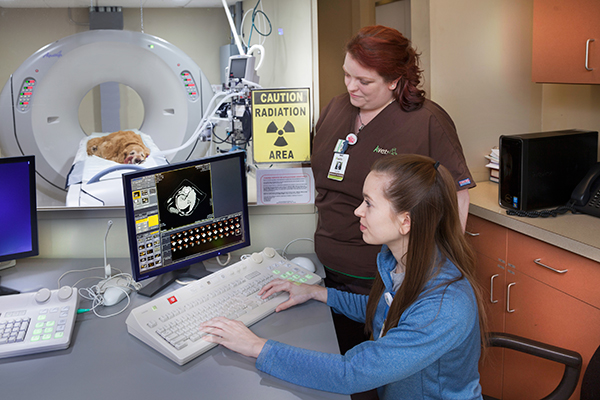Our emergency and specialty hospital comprises many departments that handle different aspects of patient care. Our internal medicine department is integral to our mission, as it focuses on diagnosing, treating, and managing a variety of acute and chronic diseases that can affect a pet’s internal body systems. Our board-certified veterinary internists have experience diagnosing and treating the most complex medical conditions, including:
Your family veterinarian can treat many medical conditions, but if your pet develops a complicated disease, she may require expertise and specialized equipment available only at a specialty hospital. We are fortunate to have advanced diagnostic equipment, including veterinary ultrasound, endoscopy, and computed axial tomography (CT), that helps us tackle the most challenging cases.

As an ultrasound probe is moved over your pet’s skin, sound waves that bounce off internal structures are emitted, received, and translated into an image the operator sees on a screen. Ultrasound transmits real-time images, allowing us to observe the anatomy and function of many internal organs, such as the stomach, kidney, and uterus. We can evaluate growing puppies or kittens, assess the kidneys for normal architecture, and observe digestive function.
An echocardiogram, which is a specialized ultrasound of the heart, is an invaluable diagnostic tool for animals with heart conditions. An echocardiogram allows us to watch the heart pumping blood, observe blood flow, assess heart valve function, and measure heart-chamber size and wall thickness. We perform echocardiograms on patients whom our veterinary staff evaluate, as well as patients referred to us by their family veterinarians who are managing their heart disease.
During endoscopy, we introduce a tiny camera into your pet’s natural body opening, such as her mouth or nose, or through a small incision made into a body cavity, such as her thorax or abdomen. Endoscopy is a minimally invasive method of visualizing internal body structures for examination, sample collection, or surgical procedures. We can perform a number of endoscopic procedures, including:

A CT scan takes multiple slice-like X-rays of a patient, which are assembled into three-dimensional images of the selected body area. CT is often used when more detail is needed than traditional X-rays can provide, and has a variety of uses in veterinary medicine, including:
Your pet must remain completely still during a CT scan, so she will be heavily sedated or anesthetized. Our trained veterinary technicians will monitor her through the entire procedure, which usually takes less than an hour. We can perform CT scans of patients who present to our emergency department, or those referred by their family veterinarian.
Our internal medicine department is part of a larger collaboration dedicated to providing the best medical care available for western Pennsylvania pets. Our “one hospital” model allows our various departments to work together, using cutting-edge technology to diagnose and manage the most challenging medical cases.
If your family veterinarian has referred you to Avets for advanced diagnostics or treatment, contact us.